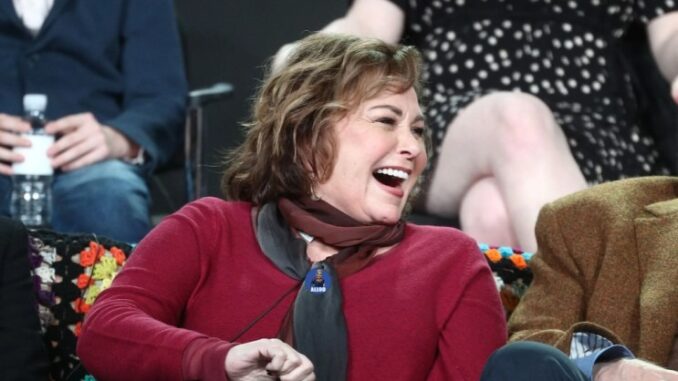
Press suggesting The Conners “will flop without its star” shouldn’t detract from the fact that the spin-off is very much in keeping with the original spirit of Roseanne.
Days before a Roseanne spin-off was set to premiere on ABC without its matriarch, Roseanne Barr called The Conners “a mindwarp and a mindfuck” in an interview last Thursday with comedian Joe Rogan that was part of a sudden flurry of pro-Barr media. A headline in the Daily Mail screamed, “People want Roseanne!” The story suggested that executives inside ABC feared “the show’s replacement spin-off will flop without its star.” The article quickly cycled through sites like Breitbart, the Daily Caller, and the Washington Examiner, and conspiracy theories unspooled on the pro-Trump “TheDonald” subreddit.

The Conners has been a battleground in the new culture wars since it was announced, just as Roseanne was from the moment it premiered earlier this year. The latter’s huge ratings success (the premiere brought in 18.1 million viewers) was a point of pride for Donald Trump supporters, but its attempts to play both sides politically muddled the writing. Now that Barr is off the show, The Conners has a chance to tap back into the power of the original series. Although Barr’s character was the magnetic center, it was always an ensemble comedy, and the remaining cast is fantastic. John Goodman, Laurie Metcalf, and Sara Gilbert can comfortably carry The Conners, and in the new episodes I saw last Friday, Lecy Goranson has grown comfortable in Becky’s skin once again, and gets many of the best lines.
Creatively, The Conners proves that this family can survive without Roseanne. But can the show lure back an audience soured by the polarizing controversy around Barr’s tweets? This isn’t any old, well-made, working-class family sitcom (like The Middle, for instance), and ABC will likely struggle to pull together the same gigantic coalition of viewers again.
For the Barr-diehards, her removal from the show is too bitter a pill to swallow; they’d rather stay embittered about it. Barr has, in fact, become the symbol of unrepentant and unapologetic deplorableness, a rallying cry and cause célèbre for red-state intransigence.
During Barr’s two-hour-long interview with Rogan, she chain-smoked and attributed her downfall to tweeting under the influence of Ambien and alcohol. Rogan repeatedly tried to frame her actions in a sympathetic cast: “If someone has something wrong with their leg, you don’t expect them to run a marathon. . . . If someone has a mental-health issue and they do something erratic, or they say something that’s inappropriate, and then they apologize for it . . . ” At one point, as Rogan is making this argument, Barr lets loose a loud belch.
The timing of the pro-Barr media onslaught felt pointed. After all, Trump supporters had embraced the Roseanne reboot. Both Barr and her character had proclaimed themselves MAGA-lovers, and the president himself had proudly claimed credit for the show’s success. “Look at Roseanne! Look at her ratings!” he told a crowd after the unexpectedly large initial ratings came in earlier this year. “They were unbelievable! Over 18 million people! And it was about us!”
He wasn’t entirely wrong: ABC had green-lighted the show’s revival, in the hopes of tapping into the populist cultural wave that had swept Trump into the White House. “We had spent a lot of time looking for diverse voices in terms of people of color and people from different religions and even people with a different perspective on gender,” ABC Entertainment president Channing Dungey, the first black president of a major broadcast network, said after the show premiered. “But we had not been thinking nearly enough about economic diversity and some of the other cultural divisions within our own country.”
herself was eager to fight for that point of view in the show. As she told me when I interviewed her earlier this year, “I wanted that voice [of the Trump voter] in there, and then I thought, Well, it should be me.”
The original Roseanne was one of the great TV portraits of a working-class family: Roseanne and Dan Conner worked grinding jobs, patching together enough cash to keep food on the table. Everything in the their life was a compromise, and their kids’ horizons were likewise limited—something made clear by the reboot, which found creative spark and nonconformist Darlene returning, battered by life as an unemployed single mom, while older sister Becky worked as a waitress.
In its original incarnation, though, the show’s progressive perspective felt organic. Roseanne celebrated gay marriage, and righteously batted away racists and misogynists. It’s hard to imagine Roseanne Conner of the 1980s and 1990s supporting the administration behind the Muslim ban and Brett Kavanaugh.

The revamped Roseanne was uneven in its single season on the air. It may have aspired to be a “unifying force,” as star and executive producer Sara Gilbert proposed, and it did—for a few months—bring together a fragile, ratings-booming coalition of conservative and progressive viewers. But it often felt didactic, blatant in its attempts to court a polarized country with topical conversation about the election, Muslim neighbors, and opioids. Any miscalculation could throw the whole project off, like banter in one episode (“We missed all the shows about black and Asian families”) that seemed like a racist dog whistle directed at ABC’s diverse family programs, even as Black-ish creator Kenya Barris was struggling with the network’s pushback on his episode about Trump’s America.
The bigger problem, of course, was Barr herself, whose toxic tweeting seeped into the groundwater of the show. The week of the series’s premiere, she shared a tweet accusing Parkland-shooting survivor David Hogg of giving a Nazi salute, and referenced a debunked Pizzagate-related theory. On the morning of May 29, she posted tweets about Chelsea Clinton and George Soros, and compared Valerie Jarrett to an ape, forcing ABC’s already shaky hand. If the network continued airing the show, it risked triggering a mass boycott by viewers and advertisers, not to mention an exodus of performing and writing talent, like comedian Wanda Sykes, a consulting producer on Roseanne who immediately tweeted that she was resigning from the series.
So ABC did the unthinkable: they booted the titular central character and her same-name performer from the show, and rebooted Roseanne as The Conners, with everybody but her. They’re hoping to salvage and repair a damaged brand, and to do right by the super-talented cast, the writing team, and everyone involved in producing the show, who otherwise would be out of a job. But it could also come across as the ultimate middle finger to the person who brought the crisis down upon herself and her TV family.
Where does this leave Barr herself, now dethroned from the queendom she created? She told Rogan she’s planning to return to stand-up next year: “By then, my gag order will be over.” When Rogan questioned her about the gag order, she replied quietly, “It’s a part of the gag order that I can’t talk about the gag order.”
Barr acknowledged in the interview that she had broken a verbal agreement with ABC not to tweet: “I promised them over and over, and though they never sent it in writing . . . I should’ve stayed off Twitter. I did it to myself—I made a mistake.”
She said that one of her daughters—“a social-justice warrior-type”—had subsequently taken her Twitter account away. When Barr asked why it was O.K. for her liberal daughter to tweet about politics, Barr’s daughter replied, “Well, mother, I didn’t lose everything. We’re only trying to help you.”
